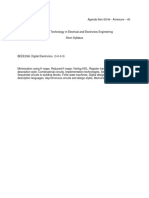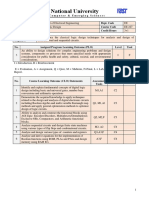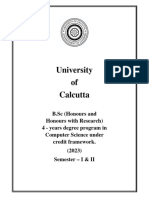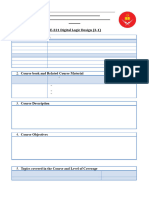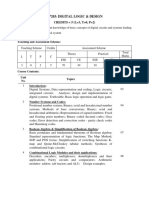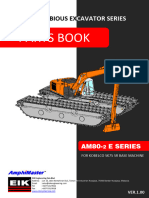DLD CC-110
DLD CC-110
Uploaded by
fizaan.mughal.01Copyright:
Available Formats
DLD CC-110
DLD CC-110
Uploaded by
fizaan.mughal.01Copyright
Available Formats
Share this document
Did you find this document useful?
Is this content inappropriate?
Copyright:
Available Formats
DLD CC-110
DLD CC-110
Uploaded by
fizaan.mughal.01Copyright:
Available Formats
1) Computing Core
Course Title Digital Logic Design
Course Code CC-110
Credit Hours 2 (2,0)
Category Computing core
Prerequisite None
Co-Requisite None
Follow-up CC-210 Computer Organization & Assembly Language
Course The course introduces the concept of digital logic, gates and the digital circuits. Further, it
focuses on the design and analysis combinational and sequential circuits. It also serves to
Introduction familiarize the student with the logic design of basic computer hardware components.
At the end of the course, the students will be able to: BT PLO
CLO1: Acquire the basic knowledge of logic gates and digital logic
Course C1 (Acquire) 1
circuits
Learning
Outcomes CLO2: Understand the working of the fundamental digital C2
1,2
(CLOs) circuits used in digital systems and computers. (Understand)
CLO3: Designing a digital circuit for implementing a given
C3 (Apply) 3,4
scenario.
Topics: Introduction to Digital Systems, Number Systems, Introduction to Boolean
Algebra, Basic theorems and properties of Boolean Algebra, Boolean Functions, Logic
Gates, NAND and NOR Implementation, Representation of Function in Sum of Minterms or
Product of Maxterms, Simplification of Boolean function using Karnaugh Map, Don’t care
Conditions, The Tabulation Method, Introduction to Combinational Logic, Design of
Adders, Design of Subtractors, Code Convertors, Analysis Procedure of Combinational
Circuits, Binary Parallel Adders, Decimal Adders, Magnitude Comparator, Decoders and its
Syllabus applications, Multiplexers, Demultiplexers, Encoders, ROM, Programmable Logic Array
(PLA), Introduction to Sequential Circuits, Basic Flip Flop, Clocked RS Flip Flop, Clocked
D Flip Flop, Clocked JK Flip Flop, Clocked T Flip Flop, Analysis of Clocked Sequential
Circuits, State Reduction and Assignment, Flip Flop Excitation tables, Design Procedure,
Design of Counters, Design with State Equations, Introduction to Registers, Shift Registers,
Ripple Counters, Synchronous Counters , Timing Sequences, Memory Unit, Random Access
Memory. Introduction Programmable Logic Devices (CPLD, FPGA), Lab Assignments using
tools such as Verilog HDL/VHDL, MultiSim.
1. M. Morris Mano, Digital Logic and Computer Design, 1 st Edition, Pearson, 1979, ISBN:
Suggested
0132145103.
Instructional/
2. Thomas L. Floyd, Digital Fundamentals, 10th Edition, Prentice Hall, 2008, ISBN:
Reading
0132359235.
Material
3. Fundamental of Digital Logic with Verilog Design, Stephen Brown, 2/e
Page 13 of 56
You might also like
- Custom Wood Vibroplex Carrying Case Construction DetailsDocument4 pagesCustom Wood Vibroplex Carrying Case Construction DetailsPeter SimpsonNo ratings yet
- Digital Circuits and SystemsDocument3 pagesDigital Circuits and SystemsAayush JainNo ratings yet
- DLD CC-110-LDocument1 pageDLD CC-110-Lfizaan.mughal.01No ratings yet
- CS2031 Digital Logic Design OBE AdnanDocument4 pagesCS2031 Digital Logic Design OBE Adnanseemialvi6No ratings yet
- Digital Circuits and SystemsDocument2 pagesDigital Circuits and SystemsSuvdeep NayakNo ratings yet
- Cse1003 Digital-logic-And-Design Eth 1.1 47 Cse1003Document8 pagesCse1003 Digital-logic-And-Design Eth 1.1 47 Cse1003Shiva Charan0% (2)
- Mapping of Course Outcomes With Student Outcomes CO - NO. Course Outcome's Mapped SO BTLDocument7 pagesMapping of Course Outcomes With Student Outcomes CO - NO. Course Outcome's Mapped SO BTLMohan KumarNo ratings yet
- Digital LogicsDocument3 pagesDigital Logicsattitudeking565No ratings yet
- 4) Demp - Wase & WimsDocument8 pages4) Demp - Wase & WimsRashmitha RavichandranNo ratings yet
- Gujarat Technological University: W.E.F. AY 2018-19Document3 pagesGujarat Technological University: W.E.F. AY 2018-19Alok MauryaNo ratings yet
- DSD Syll - Merged DSD GtuDocument8 pagesDSD Syll - Merged DSD GtuSandeep kumarNo ratings yet
- Curriculum Details of Y-3 T-1Document29 pagesCurriculum Details of Y-3 T-1Mr. KamaruzzamanNo ratings yet
- DLD Theory F23Document4 pagesDLD Theory F23Imran Ahmad AhmadNo ratings yet
- Ita1002 Digital-Computer-Fundamentals Eth 1.0 0 Ita1002Document2 pagesIta1002 Digital-Computer-Fundamentals Eth 1.0 0 Ita1002ShivamNo ratings yet
- Digital Logic Design Course and LAB OutlineDocument3 pagesDigital Logic Design Course and LAB Outlinesalman100% (1)
- Digital Logic DesignDocument8 pagesDigital Logic DesignShubham ChoksiNo ratings yet
- Digital Eelectronics SyllabusDocument4 pagesDigital Eelectronics Syllabuskbp.amdNo ratings yet
- CS 4th Semester SyllabusDocument13 pagesCS 4th Semester SyllabusManish KumarNo ratings yet
- Digital ElectronicsDocument2 pagesDigital ElectronicschumkapilliNo ratings yet
- BEEE206L - DIGITAL-ELECTRONICS - TH - 1.0 - 67 - Digital ElectronicsDocument3 pagesBEEE206L - DIGITAL-ELECTRONICS - TH - 1.0 - 67 - Digital ElectronicsNithish kumar RajendranNo ratings yet
- EE227 - Course Outline v.00.00.00 - 2018-12-20Document2 pagesEE227 - Course Outline v.00.00.00 - 2018-12-20Muhammad Akif NaeemNo ratings yet
- CSE 1003 - DigitalLogicDesignDocument9 pagesCSE 1003 - DigitalLogicDesignTeja nNo ratings yet
- Digital Electronics TEE: CO1 CO2 CO3 CO4 CO5 CO6Document2 pagesDigital Electronics TEE: CO1 CO2 CO3 CO4 CO5 CO6Anonymous HyOfbJ6No ratings yet
- DE DLD SyllabusDocument4 pagesDE DLD SyllabusMr. RAVI KUMAR INo ratings yet
- DSD SyllabusDocument2 pagesDSD SyllabusprasathvlsiNo ratings yet
- Digital Logic DesignDocument2 pagesDigital Logic DesignpremNo ratings yet
- EE206 DigitalSystemDesignDocument2 pagesEE206 DigitalSystemDesignRajalearn2 Ramlearn2No ratings yet
- Gujarat Technological University: Semester - III Subject Name: Digital ElectronicsDocument3 pagesGujarat Technological University: Semester - III Subject Name: Digital ElectronicsBhargavsinh ParmarNo ratings yet
- BS (CS, CE) EE221-Logic DesignDocument3 pagesBS (CS, CE) EE221-Logic DesignOsman MehmoodNo ratings yet
- BCA 3rd Sem TBC303 Digital Logic DesignDocument3 pagesBCA 3rd Sem TBC303 Digital Logic Designabhinandansharma55655No ratings yet
- Obe Curriculum For The Course: RGPV (Diploma Wing) BhopalDocument22 pagesObe Curriculum For The Course: RGPV (Diploma Wing) BhopalHarshit Sahu CS-26No ratings yet
- 3044Document4 pages3044nautiyalservicesNo ratings yet
- BCA_3rd Sem_23OBC303_Digital Logic DesignDocument3 pagesBCA_3rd Sem_23OBC303_Digital Logic Designdfartyal74No ratings yet
- 1st Year SyllabusDocument7 pages1st Year Syllabuschhotonroy98745No ratings yet
- JDocument1 pageJ;(No ratings yet
- Syllabus DLD Fall 2020-2021Document2 pagesSyllabus DLD Fall 2020-2021Mahmoud Alshar'eNo ratings yet
- Demulti Plexer and MultiolexerDocument7 pagesDemulti Plexer and Multiolexerkaran007_mNo ratings yet
- DPCO Syllabus (Theory Cum Practical)Document2 pagesDPCO Syllabus (Theory Cum Practical)yogeshwaran.r2022lcseNo ratings yet
- 14267Document1 page14267kisanthreshersNo ratings yet
- Syllabi Special Computer Full 17E and Above Nov2020Document88 pagesSyllabi Special Computer Full 17E and Above Nov2020Vinodh LahiruNo ratings yet
- EEE241-DLD Course OutlineDocument2 pagesEEE241-DLD Course OutlineZeeshan TahirNo ratings yet
- B.tech Cse VTR Uge2021 de SyllabusDocument4 pagesB.tech Cse VTR Uge2021 de SyllabusBOLLIGARLA MOHAN SAI AKASH,CSE2021 Vel Tech, ChennaiNo ratings yet
- PDFDocument4 pagesPDFArpit PatelNo ratings yet
- DIGI330163 - Digital SystemsDocument8 pagesDIGI330163 - Digital SystemsNguyễn Trọng KhoaNo ratings yet
- FDH Digital Logic DesignDocument3 pagesFDH Digital Logic Designzainhassann44No ratings yet
- NUST Syllabus For DLDDocument2 pagesNUST Syllabus For DLDwistfulmemory100% (1)
- Syllabus DLDA DSLDocument4 pagesSyllabus DLDA DSLShirish RansingNo ratings yet
- Dl&co SyllabusDocument3 pagesDl&co Syllabusmanasaveena.tNo ratings yet
- 21MDS15-course-planDocument3 pages21MDS15-course-planvaniNo ratings yet
- Gujarat Technological University: W.E.F. AY 2018-19Document4 pagesGujarat Technological University: W.E.F. AY 2018-19useless9925No ratings yet
- Dec3033 Computer Architecture and Organization - SDocument7 pagesDec3033 Computer Architecture and Organization - Skshika meganathanNo ratings yet
- AEM and DE SYLLABUS 3rd SEMESTERDocument1 pageAEM and DE SYLLABUS 3rd SEMESTERAR OFFICIALNo ratings yet
- Syllabus BCS302 COMPUTER ORGANIZATION AND ARCHITECTUREDocument1 pageSyllabus BCS302 COMPUTER ORGANIZATION AND ARCHITECTUREMr. Manoj Kr. Sharma EceNo ratings yet
- Structural Digital System Design - Lession PlanDocument1 pageStructural Digital System Design - Lession Planviswanathsreenath200No ratings yet
- Fundamentals of Digital Logic Department of Electrical EngineeringDocument15 pagesFundamentals of Digital Logic Department of Electrical EngineeringSaifullahNo ratings yet
- CP203 Digital Logic & DesignDocument2 pagesCP203 Digital Logic & Designviral patelNo ratings yet
- GTU Digital ElectronicsDocument3 pagesGTU Digital Electronicssjbv.hardik582No ratings yet
- Build Logic Gates with Universal NAND: CMOS and TTL in ActionFrom EverandBuild Logic Gates with Universal NAND: CMOS and TTL in ActionNo ratings yet
- Practical TTL Logic Gates: 74LS Integrated Circuits in ActionFrom EverandPractical TTL Logic Gates: 74LS Integrated Circuits in ActionNo ratings yet
- DLD 1st SemesterDocument71 pagesDLD 1st Semesterfizaan.mughal.01No ratings yet
- Arabic ZmairDocument22 pagesArabic Zmairfizaan.mughal.01No ratings yet
- ComplimentDocument18 pagesComplimentfizaan.mughal.01No ratings yet
- BS IT All Semester Course CodesDocument2 pagesBS IT All Semester Course Codesfizaan.mughal.01No ratings yet
- Instructions For Installing The Oracle VMDocument5 pagesInstructions For Installing The Oracle VMkenosimokoka311No ratings yet
- Solution For MicroprocessorDocument5 pagesSolution For Microprocessoryash7840gaikwadNo ratings yet
- Class 11 NotesDocument5 pagesClass 11 Notesprasadayush367No ratings yet
- Creditcardrush JSONDocument31 pagesCreditcardrush JSONmatgonzasep100% (1)
- Computer System Servicing: Quarter 1 - Module 1: Core: Computer HardwareDocument16 pagesComputer System Servicing: Quarter 1 - Module 1: Core: Computer HardwareArvie-Jay LapigNo ratings yet
- Ram Vs RomDocument1 pageRam Vs RomgideyNo ratings yet
- LAB-7: Interfacing Liquid Crystal Display (LCD) : ObjectivesDocument6 pagesLAB-7: Interfacing Liquid Crystal Display (LCD) : ObjectivesTahir NisarNo ratings yet
- 1-Operating System As A Resource ManagerDocument13 pages1-Operating System As A Resource Managerranaalam45171No ratings yet
- Name: Last Name:: Kevin Smith Liberato RereyesDocument3 pagesName: Last Name:: Kevin Smith Liberato RereyesKevin Smith Liberato ReyesNo ratings yet
- 4-Registers and Register Files - Interconnection of Components-08!01!2024Document28 pages4-Registers and Register Files - Interconnection of Components-08!01!2024shashank.reddy5804No ratings yet
- PolarFire SoC FPGA Motion JPEG Video Streaming Over Ethernet Application Note AN4520Document37 pagesPolarFire SoC FPGA Motion JPEG Video Streaming Over Ethernet Application Note AN4520vinod karuvatNo ratings yet
- HP Z420 Quick SpecsDocument2 pagesHP Z420 Quick SpecsCraciun PaulNo ratings yet
- Week 7 - StorageDocument15 pagesWeek 7 - StorageKen Tuan CelisNo ratings yet
- Cloud Computoing Module IDocument24 pagesCloud Computoing Module IJEEVA P GNo ratings yet
- Altera Nios II BSP SummaryDocument12 pagesAltera Nios II BSP SummarywwasdNo ratings yet
- 2018 Wiring Diagram Manual - 20kw - 123127Document7 pages2018 Wiring Diagram Manual - 20kw - 123127Yovan MamaniNo ratings yet
- Bangladesh University of Professionals: Cloud ComputingDocument9 pagesBangladesh University of Professionals: Cloud ComputingMD Monowar Ul IslamNo ratings yet
- Fire-Lite Panels Suggested Firmware Upgrade: Fire-Lite Alarms - One Fire-Lite Place, Northford, CT 06472Document1 pageFire-Lite Panels Suggested Firmware Upgrade: Fire-Lite Alarms - One Fire-Lite Place, Northford, CT 06472Christopher DaMatta BarbosaNo ratings yet
- Am80-2e Parts Book (Sk75)Document36 pagesAm80-2e Parts Book (Sk75)ZayNo ratings yet
- 790374-1 Control PanelDocument140 pages790374-1 Control PanelmantenimentsadaNo ratings yet
- Shafts and Shaft Components: Axle Is A Nonrotating Member That Carries No Torque and Is Used ToDocument12 pagesShafts and Shaft Components: Axle Is A Nonrotating Member That Carries No Torque and Is Used ToalhaggagiNo ratings yet
- Hydraulic Bolt Tensioning 10022-1817-C-0002-SC17-00027Document40 pagesHydraulic Bolt Tensioning 10022-1817-C-0002-SC17-00027lemuel bacsaNo ratings yet
- Model Name:GA-G41M-Combo: Revision 2.0Document33 pagesModel Name:GA-G41M-Combo: Revision 2.0mario ortegaNo ratings yet
- Service Manual & Troubleshooting Guide ForDocument175 pagesService Manual & Troubleshooting Guide Forharis ansoriNo ratings yet
- Stock Disponible 10 A.MDocument6 pagesStock Disponible 10 A.Mcamilomoreno1058No ratings yet
- Microprocessor 1Document31 pagesMicroprocessor 1priyanshubisht2580No ratings yet
- Debugger TricoreDocument145 pagesDebugger TricoreTihomir VincicNo ratings yet
- The Design of Smart Power Meter Based On ARM9 MicroprocessorDocument8 pagesThe Design of Smart Power Meter Based On ARM9 MicroprocessorFelipe Jaime Ferreira PintoNo ratings yet
- Computer Technology INGLES IIDocument3 pagesComputer Technology INGLES IImicaela bernacheaNo ratings yet



















